The United Nations World Food Programme (WFP) in Afghanistan has received a contribution of £40mn (over $50mn) from the United Kingdom’s Foreign, Commonwealth and Development Office (FCDO). This funding aims to bolster WFP’s emergency food assistance and resilience-building initiatives, reaching over 1.2mn people in Afghanistan.

With this contribution, WFP will provide life-saving emergency food assistance, preventive malnutrition treatment for nearly 150,000 children, and support for more than 140,000 pregnant and breastfeeding mothers. Additionally, the funds will empower 77,000 food-insecure individuals to participate in asset-creation projects, fostering community resilience to the impacts of climate change.
“The UK remains committed to supporting the people of Afghanistan,” stated Hamish Falconer, UK Minister for the Middle East and North Africa. “This new funding to the World Food Programme will help more than one million people with vital emergency food and nutrition assistance. We are also investing in interventions that will help build the resilience of vulnerable communities, better equipping them to prepare for the impacts of climate change.”
This latest contribution will enable WFP to procure nearly 9,000 metric tons (mt) of essential food items, including fortified wheat flour, vegetable oil, split peas, and iodized salt, for distribution through its emergency and resilience programmes. Additionally, over 1,900 mt of specialized nutritious food will be provided to prevent malnutrition among vulnerable populations. Nearly $29mn will be allocated to cash or voucher programs, allowing families to purchase food from local markets.
“WFP often remains the last lifeline for Afghan women and families who can barely make ends meet and need food assistance to survive,” said Hsiao-Wei Lee, WFP Country Director in Afghanistan. “With support from our partners like the United Kingdom, WFP can reach some of the most vulnerable people while also continuing to build a more resilient, food-secure future for rural communities.”
WFP’s resilience programme in Afghanistan focuses on mitigating the impacts of climate-related shocks, such as droughts and floods, which contribute to widespread hunger. Through food assistance-for-assets (FFA) initiatives, participants receive food in exchange for their work on community assets like water canals or flood protection walls, benefiting entire villages. The funding will also support smallholder farmers with climate-smart seeds and equipment, kitchen garden creation, food processing with solar driers, and beekeeping.
In 2023, WFP reached 18.6mn people across all its programmes, including 9.4mn women and girls. The organization distributed 600,000 mt of food and disbursed $190mn in cash or vouchers to help families meet their food needs.
This contribution from the UK builds on last year’s donation of over £38mn (almost $49mn) and strengthens the UK’s position as the second-largest donor to WFP in Afghanistan this year.
Follow Daryo's official Instagram and Twitter pages to keep current on world news.
Comments (0)